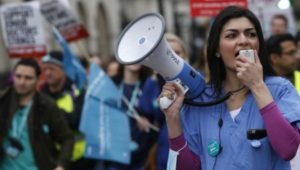The Catholic Church recognizes the rights and responsibilities of humans in civil society. This teaching, the third of 7, encompasses many ideals promoted in both American political parties. This teaching includes, but is not limited to, one’s right to shelter, work, conscience, public assistance in times of need, and access to health care. This teaching, codified in the Catechism, has been supported in countless encyclicals and church documents over the years, including Pope John XXIII’s Pacem in Terris and in the Synod of Bishops’ Justicia in Mundo. The fourth theme of Catholic social teaching, also covered in this installment, is the option for the poor and vulnerable. These two teachings are directly intertwined, as many of the rights and responsibilities outlined in the third teaching relate to ensuring that impoverished and marginalized people have basic access to things like food, shelter, social services, and more. This teaching was emphasized most recently in Pope Francis’ 2013 apostolic exhortation, Evangelii gaudium.
The Right to Food and Shelter
The right to food and shelter, which covers modern American issues like food stamps, housing vouchers, and more, is not a particularly high-profile issue, but affects millions of Americans across the country. Ensuring that the poor, disabled, young, and oppressed people in the U.S. have access to these human necessities is a key component of the fourth teaching as well.
The Republicans
Republicans have advocated for making significant reforms to SNAP (Supplemental Nutritional Assistance Program) benefits, including requirements for all recipients to be employed and drug-tested in order to receive them. They also support scaling back the role of federal housing programs.  The current administration has proposed giving benefit recipients boxes of food rather than monetary benefits that can be used to buy food on their own. Republicans view this as giving a “hand up rather than a hand out,” though the research is inconclusive regarding whether or not these requirements move people off welfare. That said, Republicans are in favor of giving states more leeway on benefits through block grants to states, which allow them to choose how money is spent on these programs.
The current administration has proposed giving benefit recipients boxes of food rather than monetary benefits that can be used to buy food on their own. Republicans view this as giving a “hand up rather than a hand out,” though the research is inconclusive regarding whether or not these requirements move people off welfare. That said, Republicans are in favor of giving states more leeway on benefits through block grants to states, which allow them to choose how money is spent on these programs.
The Democrats
Democrats, on the other hand, oppose any of these changes to social programs, including cuts to benefits and a move to block grants to individual states. Democrats are also supportive of expanding affordable housing, increasing homeowners’ tax breaks, and increasing the supply of housing. On this issue, Democrats are more in line with Church teachings on access to food and shelter, given their support for the expansion of these programs. However, Republicans are more in line with the views of the Church on subsidiarity, in which higher levels of government allow lower levels to administer the programs.
Rights of The Vulnerable
The rights of vulnerable peoples, like the sick, elderly, and unemployed, to things like social security, pensions, and other public assistance programs were first outlined in Pope John Paul II’s Laborem excerns encyclical. This right also aligns with the teaching that the vulnerable must be afforded the preferential option in policymaking.  In the United States, these benefits are offered through Medicare, and Social Security, to the elderly; Temporary Assistance For Needy Families, or TANF, for the unemployed; and disability benefits to the sick and injured. These programs are largely supported by Americans regardless of partisan affiliation, but official party platforms differ greatly.
In the United States, these benefits are offered through Medicare, and Social Security, to the elderly; Temporary Assistance For Needy Families, or TANF, for the unemployed; and disability benefits to the sick and injured. These programs are largely supported by Americans regardless of partisan affiliation, but official party platforms differ greatly.
The Republicans
Republicans’ views on TANF are similar to that on SNAP; they support block grants and stringent requirements for eligibility. In their platform, Republicans support “preserving Social Security” with few specifics, but they reiterate the need to protect its solubility. They also support reforming Medicare and its partial privatization, which would allow seniors to opt out of the program.
The Democrats
Democrats oppose changes to TANF, like other welfare programs. They support expanding Social Security benefits, and expanding Medicare to those between 55 and 65 who wished to opt in. On the issue of access to social security and pensions for the vulnerable, Democrats are more in line with Church teaching because of their support for the protection and expansion of these programs, though Republicans are more concerned with the long-term solvency and size of these programs than Democrats.
The Right to Freedom and Dignity
The rights to religious freedom and to one’s dignity and conscience include the right to worship as one chooses, or not at all, and to make decisions free from governmental intrusion according to one’s conscience.
The Republicans
Republicans consider themselves staunch defenders of religious liberty, and they oppose restrictions on religiously-affiliated institutions to operate according to their beliefs. As such, they do not support laws that mandate businesses and workers violate their closely-held beliefs. 
The Democrats
Democrats also consider themselves strong defenders of religious liberty. They oppose religious tests and discrimination against religious minorities, but also oppose laws mandating conscience protections. Both Democrats and Republicans consider themselves, and are, defenders of this issue. Republicans are more broadly protective of any American’s right to practice their religion, not just in worship but also in their everyday lives, while Democrats seek a balance between religious liberty and not imposing one’s beliefs on another.
Free Speech
The right to free speech and thought is among the most important rights guaranteed in the Constitution, specifically protected in the First Amendment.  Both Democrats and Republicans broadly support this right, though they differ in how they apply this right to certain entities.
Both Democrats and Republicans broadly support this right, though they differ in how they apply this right to certain entities.
The Democrats
Democrats believe that only people, and not corporations or unions, have a right to free speech, and they support restrictions on political contributions of non-persons.
The Republicans
Republicans believe that non-persons are entitled to make political contributions, and endorse “free-market approaches” to the issue of speech. However, free speech of corporate and other entities are not covered in the teaching of the church. Neither party supports attempts to restrict the speech of individual Americans, and both are in line with Church teaching.
Conclusion
Fundamental rights and responsibilities of all humans, and the care for the poor and vulnerable in particular, are recognized by the Catholic Church, and the Church calls on all nations to do the same. To varying extents, both Republicans and Democrats support Church teaching on these issues. Republicans are often more concerned with the economic viability and delivery of programs that provide assistance to the poor, while Democrats are more supportive of expansions to these programs. They are both strongly supportive of freedom of speech and worship, but Republicans support defending these rights more broadly, including conscience protections for workers and businesses, and speech rights for corporations. Stay tuned for the next edition, where we will discuss the Church teaching, “The Dignity of Work and the Rights of Workers.” 






